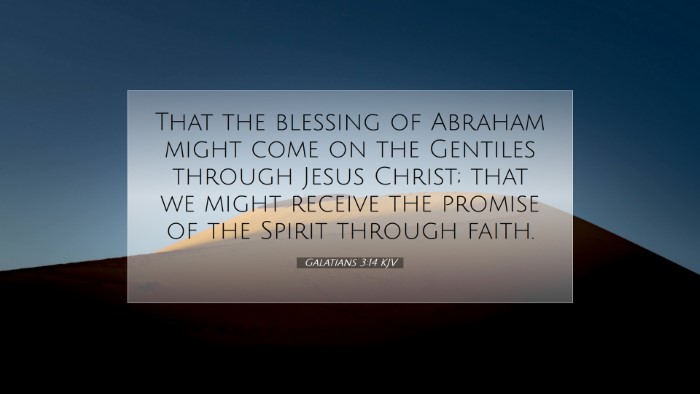Galatians 3:14 - Commentary Overview
Galatians 3:14 states: "That the blessing of Abraham might come on the Gentiles through Jesus Christ; that we might receive the promise of the Spirit through faith." This verse is pivotal in illustrating the theological significance of faith in Christ and the inclusion of the Gentiles in God's promises. Through insights derived from notable public domain commentaries, we will explore its implications.
Historical Context
Understanding the historical context of Paul’s letter to the Galatians is crucial. The Galatian church faced the challenge of Jewish legalism, where certain teachings insisted that adherence to Jewish law was necessary for salvation. Paul addresses this directly in Galatians 3, emphasizing faith over works.
The Blessing of Abraham
Matthew Henry highlights that the "blessing of Abraham" refers to the promises made to Abraham, specifically the promise of a great nation and blessings to all families of the earth through him (Genesis 12:3). This blessing, rooted in faith, transcends ethnic boundaries, allowing Gentiles to be grafted into the covenant relationship with God.
-
Inclusivity of the Gospel: Henry explains that the blessing is not limited to the Jews but extends to all who believe. The grace extended through Christ abolishes divisions based on ethnicity or adherence to law, affirming that faith is the key to inheritance.
-
The Role of Faith: Albert Barnes emphasizes that receiving the blessings promised to Abraham is contingent upon faith. Just as Abraham’s faith was credited as righteousness, so too must believers be justified by faith, not by works.
Jesus Christ as the Mediator
Adam Clarke notes that the Gentiles receive the blessing through Jesus Christ, who is portrayed as the mediator of the New Covenant. This underlines the centrality of Christ in salvation, positioning Him as the fulfillment of all Old Testament promises.
-
The Mediatorial Role: Clarke emphasizes that it is through Christ’s sacrifice and resurrection that Gentiles gain access to the promises of God. This revelation affirms that Jesus is the bridge between God and humanity, enlightening both Jew and Gentile.
The Promise of the Spirit
The latter part of the verse emphasizes the promise of the Spirit. Henry elucidates that this reflection points to the indwelling of the Holy Spirit upon believing, which enables believers to live righteously and assures them of their status as children of God.
-
Empowerment Through the Spirit: The blessing is more than a legal declaration; it manifests in a transformative experience through the Spirit, equipping believers for godly living. Barnes affirms that the promise of the Spirit signifies God’s active presence in the lives of believers, enabling them to fulfill the law’s righteous requirements.
-
Faith’s Significance: Clarke emphasizes the importance of faith and the Spirit, asserting that individuals must rely on faith for the Spirit’s empowerment. The connection between faith and the active work of the Spirit underscores the Christian life as one lived in dependence on divine enablement.
Theological Significance
This verse encapsulates key elements of Pauline theology. Paul asserts that God’s promises, initiated with Abraham, culminate in Christ, who fulfills and expands those promises beyond the Jewish nation. Theologically, this shifts the landscape of salvation history, making it clear that God’s redemptive work is comprehensive and inclusive.
-
Covenant Theology: The inclusion of the Gentiles reaffirms covenant theology, where the unbreakable covenant of grace stands firm against the backdrop of human failures. Through Jesus, the blessings of the covenant extend to all who believe, ensuring that God's plan of redemption is universal.
-
The Nature of Blessings: The nature of blessings shifts from a mere earthly perspective to a spiritual one, focusing on the internal transformation that comes with the Holy Spirit. Barnes stresses that these blessings include peace, joy, and assurance, which are not contingent on external circumstances.
Application for Today
For pastors, students, theologians, and Bible scholars, the implications of Galatians 3:14 are profound. The inclusivity of the Gospel should challenge the church to embrace diversity within the body of Christ, actively dismantling barriers that divide. Furthermore, the call to live by faith and actively engage with the Holy Spirit invites a dynamic relationship with God that transcends mere intellectual assent.
-
Embracing Diversity: Churches are encouraged to create environments where all believers, regardless of background, can participate in the life of the community. The acknowledgment that God's promise extends to all should foster unity and love within the body of Christ.
-
Living by Faith: The imperative to live by faith emphasizes a continual reliance on God's Spirit. Pastors are challenged to teach believers about the Holy Spirit's role in their lives, fostering spiritual growth and empowerment for service.
-
Understanding Grace: This verse is a potent reminder of God’s grace. The importance of understanding grace as a unifying force is essential for theological reflection and practice within the church today. It encourages believers to offer grace to one another as they seek to live out their faith.
Conclusion
Galatians 3:14 serves as a rich text that encapsulates God’s redemptive plan through faith in Christ. As explored through the combined insights of Matthew Henry, Albert Barnes, and Adam Clarke, this verse not only highlights the fulfillment of God's promises in Christ but also invites reflection on the ongoing work of the Holy Spirit in believers’ lives. In doing so, it calls for a faith that is active, inclusive, and transformative, encouraging the church to embody these truths in a fragmented world.


